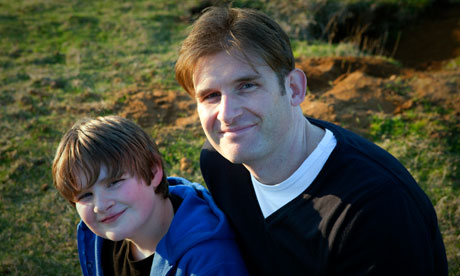
The short stories in my book, The Stone Thrower, are full of absurd, surreal and futuristic scenarios: contagion-carrying virtual pets, genetically enhanced schoolchildren in military uniforms, a superhero dictator – but at the heart of them all is a vulnerable child. My vulnerable child.
All the way through my wife Naomi's pregnancy, we imagined what our little boy would be like. Naomi is a painter and I'm a writer, so of course we hoped that he would be an artist too. We never imagined the possibility that he might be born anything other than perfect.
Usually, a cleft lip is picked up in one of the ultrasound scans, but Max's wasn't. The first we knew of it was after his birth. His face was opened up like a flower, with the upper lip split into three parts and the divisions running all the way up into his nose.
Those first moments of his life were chaotic. The cord had been wrapped around his neck, and the trauma of his long delivery meant he was covered in meconium. The room was crowded with hospital staff who whisked him away from us to clear out his mouth and give him oxygen. Whatever armour I'd built up during my 26 years to help me cope with adversity was gone. In Max, the most tender inner part of myself was now outside of my body.
Eventually they brought him back to us wrapped in a towel. We had a baby that people would find it difficult to look at. But of course he was ours and we loved him and we wanted him more than anything else. I had so many worries though. Would the doctors be able to fix him? How would people, other kids, react to him? How would he feel about himself? Would a girl ever want to kiss those lips?
A brilliant surgeon at Stoke Mandeville repaired Max's lip when he was just 10 days old, giving him the ability to smile – and what a smile. Over the next few years, the scars began to heal, and although once in a while someone noticed and remarked, often we could go whole days without thinking about it. Max began school and life was good.
But as Max got older, he began to fall behind at school. He'd pull strange faces, and swing his arm around like a propeller wherever he went. He didn't like his peas touching his ketchup.
Max was diagnosed with autistic spectrum disorder in 2007, and we began the long, arduous process of getting a statement of special educational needs. The life we'd imagined for our son moved out of reach.
Now we had a new set of worries. Would he be able to work? Would he get married, have children? Would he ever be able to look after himself or would Naomi and I always need to take care of him? Slowly, we began to come to terms with this new reality. Naomi and I talked about our fears sometimes, but mostly I worried on the page. My concerns became metaphors in stories: seabird chicks choking on fish, a child coming apart at the seams.
When Max was seven, he had a massive seizure and everything changed again.
The average tonic-clonic seizure (one where the person goes stiff and starts twitching) lasts one to three minutes. There is a rarer form of seizures called status epilepticus, which are 30 minutes or longer. Max's lasted more than an hour. It was the first of many.
When Max had an MRI scan it revealed scar tissue in his brain – most likely caused by his traumatic birth – which was the origin of the seizures.
We were referred to Great Ormond Street hospital, and later the Young Epilepsy centre in Surrey. They began to tweak Max's medications, raising and lowering levels, taking medications away and adding new ones, attempting to find the perfect cocktail to get his seizures under control.
Now, he takes five medications, which are mostly successful at keeping his seizures at bay. But at 11, and given the severity of the seizures, it's unlikely now that he'll ever grow out of it, as some children do.
It's hard to know how Max feels about all of this. His conditions mean he won't or can't talk about a lot of things. Trying to get out of him what he did at school during the day is often impossible. It's hard to say whether the cause is the seizure activity, which affects his short-term memory, or the ASD. But from the outside, he's the warmest, happiest, most charming kid.
Of course, Naomi and I live in constant terror of losing him. It means we are so grateful for every day he wakes up in the morning, and for our other son, who is not affected by the same conditions.
I guess that whenever you love anyone or anything in your life, that love comes pre-packaged with a fear of losing him or her or it. I hope that among the fantastical imagery of The Stone Thrower everyone will recognise something of his or her self. We all fear being left alone. We are not alone in that fear.

